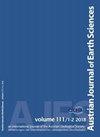奥地利上白垩统Gosau群Hofergraben段晚三东期菊石研究
IF 1.1
4区 地球科学
Q2 Earth and Planetary Sciences
引用次数: 3
摘要
图1:A.东阿尔卑斯山的地质简图。戈索群沉积物产状(黑色),砖符号:北阿尔卑斯钙质。源自Summesberger等人(2017a)。B. Gosau盆地部分地区的局部草图,在Summesberger等人(2017a)之后进行了修改,指出了文本中提到的地方。_______________________________________________________________ 文摘11亚扪人描述的上层Santonian Hofergraben站点(歌骚组;上奥地利):厚蝇科,属等种。juv。,多斑Placenticeras (Dujardin, 1837),准平面Placenticeras (Wiedmann), 1978, maherndli Summesberger, 1979, Texanites quinquenodosus Redtenbacher, 1873, Eulophoceras jacobi Hourcq, 1949, Jouaniceras hispanicum Wiedmann, 1994, ?Jouaniceras sp., Eubostrychoceras acutcostatum (d 'Orbigny, 1842), Glyptoxoceras crispatum (Moberg, 1885), Baculites fuchsi Redtenbacher, 1873。Jouaniceras hispanicum Wiedmann(1994)和Eubostrychoceras acuticostatum (d’orbigny, 1842)在Gosau群中首次记录,证实了其与上Cretataxa的密切联系本文章由计算机程序翻译,如有差异,请以英文原文为准。
On late Santonian ammonites from the Hofergraben Member (Gosau Group, Upper Cretaceous, Austria)
Figure 1: A. Schematic geological map of the Eastern Alps. Occurrences of Gosau Group sediments (black), brick symbol: Northern Calcareous Alps. After Summesberger et al. (2017a). B. Local sketch map of parts of the Gosau Basin, with modifications after Summesberger et al. (2017a) indicating the localities mentioned in the text._______________________________________________________________ Abstract 11 ammonite are described from the upper Santonian of the Hofergraben site (Gosau Group; Upper Austria): Pachydiscidae gen. et sp. indet. juv., Placenticeras polyopsis (Dujardin, 1837), Placenticeras paraplanum Wiedmann, 1978, Placenticeras aff. maherndli Summesberger, 1979, Texanites quinquenodosus Redtenbacher, 1873, Eulophoceras jacobi Hourcq, 1949, Jouaniceras hispanicum Wiedmann, 1994, ? Jouaniceras sp., Eubostrychoceras acuticostatum (d’Orbigny, 1842), Glyptoxoceras crispatum (Moberg, 1885), Baculites fuchsi Redtenbacher, 1873. Jouaniceras hispanicum Wiedmann, 1994 and Eubostrychoceras acuticostatum (d’Orbigny, 1842) are recorded for the first time from the Gosau Group confirming the close connection with the Upper Cretataxa
求助全文
通过发布文献求助,成功后即可免费获取论文全文。
去求助
来源期刊

Austrian Journal of Earth Sciences
Earth and Planetary Sciences-Paleontology
CiteScore
3.10
自引率
0.00%
发文量
0
审稿时长
>12 weeks
期刊介绍:
AUSTRIAN JOURNAL OF EARTH SCIENCES is the official journal of the Austrian Geological, Mineralogical and Palaeontological Societies, hosted by a country that is famous for its spectacular mountains that are the birthplace for many geological and mineralogical concepts in modern Earth science.
AUSTRIAN JOURNAL OF EARTH SCIENCE focuses on all aspects relevant to the geosciences of the Alps, Bohemian Massif and surrounding areas. Contributions on other regions are welcome if they embed their findings into a conceptual framework that relates the contribution to Alpine-type orogens and Alpine regions in general, and are thus relevant to an international audience. Contributions are subject to peer review and editorial control according to SCI guidelines to ensure that the required standard of scientific excellence is maintained.
 求助内容:
求助内容: 应助结果提醒方式:
应助结果提醒方式:


